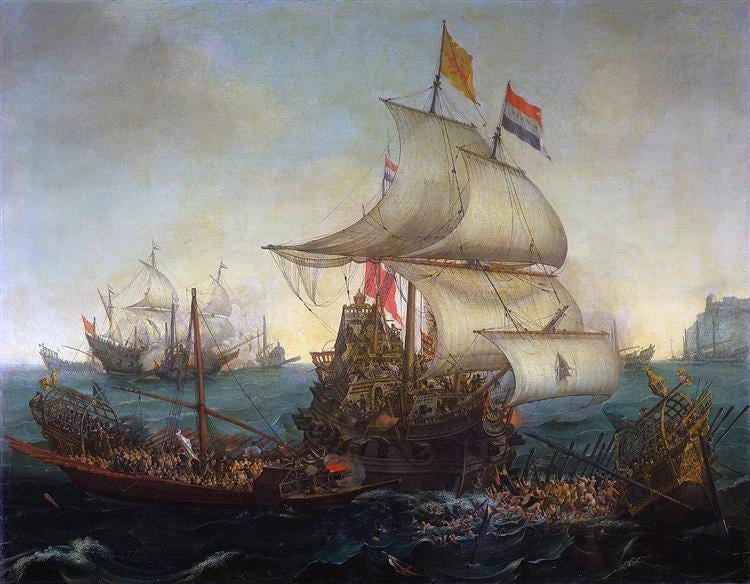On Little Nightmares
"You let your fancy soar through the void. You fix your attention on nothing."
There ought to be a word for a nightmare that doesn’t frighten, a dream with elements that the dreamer would otherwise fear but does not. There ought to be a specific word for these dreams. I’ve been having a lot of them lately, so at least I should have a term, but I don’t.
Whenever imagination fails, answers are begged for on social media. My favorite response was from the German: Albträumchen, literally a little nightmare. The English language lacks diminutives, modifiers that convey that an object is small. In the case of Albträumchen, it’s the suffix -chen, a common element in German. A Mädchen is a girl, literally a little maid. Etymologies are tricky. They don’t indicate present meaning, but you can learn a lot about history from them.
Language gives fear and gives other emotions dimensionality. As metaphors go, the equation of size to power, of size to danger, is a robust one. It corresponds to physical reality. A pencil rolls off my desk and onto my foot, harmlessly. But when, lifted for moving, the foot of the desk drops on that same foot, my own foot, the effect is somewhat different. Quantity is its own quality.
I write my little books and little newsletters. I have my little nightmares. If these sentences were in German, I could have used suffixes rather than adjectives. The nightmares are diminutive in their own particular way, like a brain removed from its skull and placed in a specimen jar, harmless but unsettling.
In my most frequent little nightmare, I’m abducted and taken aboard a galley ship, made to row endlessly across some barren and sunlit ocean. I have no idea why. I don’t remember being taken as a captive. I committed no crime nor was accused of committing one. My ship carried no valuable cargo. It didn’t battle other ships, didn’t make landings, or undertake measurements in navigation. All we did, the other crew and I, was row across a featureless ocean, with nothing but ship’s wake to disturb the placid surface of the water.
The nightmarish part of the nightmare, as I experienced it, was the labor involved, the ship discipline, which was torture and death. I remember details but won’t enumerate them. I suffered all sorts of historical cruelties. But because of the logic particular to the dream, these cruelties didn’t frighten me, even when my dreaming self was suffering immensely.
From the Middle Ages into the Early Modern era, gallies rowed by captives were common across the Mediterranean. Being taken aboard was a death sentence. There was no authority to check to see if a prisoner’s term had been served. One or five or ten years meant in perpetuity, until the end of life.
In Chapter XXII of Don Quixote, the knight errant and his squire meet a gang of convicts headed to the galley ships. Though it is obvious that these men are rogues, and are receiving the justice thought appropriate to that time and place, Don Quixote frees them from their captors. His altruism, as per usual, is repaid with a beating.
This must have been the inspiration for that particular nightmare. I’ve been rereading Don Quixote piecemeal, in an excellent translation by Edith Grossmann, these past few weeks. There is a special pleasure in reading classics without discipline.
Don Quixote and Sancho leave the scene as they usually do, battered though more or less intact, riding on to their next adventure. The convicts drop from the narrative. Their cruelty and the cruelty of their punishment furnish a single episode in a very large book, filled with other adventures and other cruelties.
Words enlarge, literally and figuratively. The comedy in Don Quixote enlivens drab circumstance. It enlivens what would otherwise be an unbearable situation, full of monotonous suffering. Sometimes the comedy becomes drab as well. The same points are made repeatedly, to varying effect. It’s a long book, filled with physical action.
Words encumber and disencumber, depending on readerly patience. They sound out experience, like breath pumped into a bagpipe, inflating the skin. Language gives joy and contentment and relief a sense of dimension. It enlarges those emotions, for better and for worse, beyond the present moment.
The lightness of the nightmares came from their intangibility, an utter lack of weight and tactile sensation. Their substance wasn’t gass, wasn’t pneuma, void instead. Our galley ship was going nowhere, but I could reconcile myself to that, as long I didn’t feel anything. And I didn’t. I didn’t feel the heat of the sun or the weight of the oar, didn’t feel the lash of the whip or the burning of hot iron. I promised I wouldn’t enumerate, so I’ll stop here.
Apart from sight, visual impression, I didn’t experience those little nightmares, not directly. They were more like vital statistics from a given year, gathered a long time ago, stripped of context. I experienced my suffering as the powerful experience the suffering of the powerless. It meant less than words.


